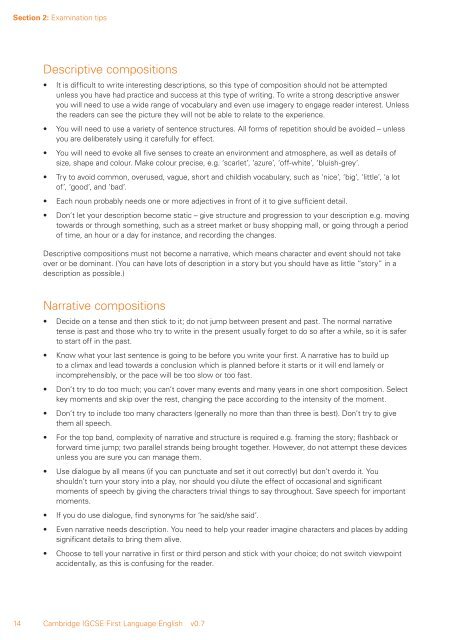163028-cambridge-learner-guide-for-igcse-first-language-english
163028-cambridge-learner-guide-for-igcse-first-language-english
163028-cambridge-learner-guide-for-igcse-first-language-english
- No tags were found...
Create successful ePaper yourself
Turn your PDF publications into a flip-book with our unique Google optimized e-Paper software.
Section 2: Examination tips<br />
Descriptive compositions<br />
• It is difficult to write interesting descriptions, so this type of composition should not be attempted<br />
unless you have had practice and success at this type of writing. To write a strong descriptive answer<br />
you will need to use a wide range of vocabulary and even use imagery to engage reader interest. Unless<br />
the readers can see the picture they will not be able to relate to the experience.<br />
• You will need to use a variety of sentence structures. All <strong>for</strong>ms of repetition should be avoided – unless<br />
you are deliberately using it carefully <strong>for</strong> effect.<br />
• You will need to evoke all five senses to create an environment and atmosphere, as well as details of<br />
size, shape and colour. Make colour precise, e.g. ‘scarlet’, ‘azure’, ‘off-white’, ‘bluish-grey’.<br />
• Try to avoid common, overused, vague, short and childish vocabulary, such as ‘nice’, ‘big’, ‘little’, ‘a lot<br />
of’, ‘good’, and ‘bad’.<br />
• Each noun probably needs one or more adjectives in front of it to give sufficient detail.<br />
• Don’t let your description become static – give structure and progression to your description e.g. moving<br />
towards or through something, such as a street market or busy shopping mall, or going through a period<br />
of time, an hour or a day <strong>for</strong> instance, and recording the changes.<br />
Descriptive compositions must not become a narrative, which means character and event should not take<br />
over or be dominant. (You can have lots of description in a story but you should have as little “story” in a<br />
description as possible.)<br />
Narrative compositions<br />
• Decide on a tense and then stick to it; do not jump between present and past. The normal narrative<br />
tense is past and those who try to write in the present usually <strong>for</strong>get to do so after a while, so it is safer<br />
to start off in the past.<br />
• Know what your last sentence is going to be be<strong>for</strong>e you write your <strong>first</strong>. A narrative has to build up<br />
to a climax and lead towards a conclusion which is planned be<strong>for</strong>e it starts or it will end lamely or<br />
incomprehensibly, or the pace will be too slow or too fast.<br />
• Don’t try to do too much; you can’t cover many events and many years in one short composition. Select<br />
key moments and skip over the rest, changing the pace according to the intensity of the moment.<br />
• Don’t try to include too many characters (generally no more than than three is best). Don’t try to give<br />
them all speech.<br />
• For the top band, complexity of narrative and structure is required e.g. framing the story; flashback or<br />
<strong>for</strong>ward time jump; two parallel strands being brought together. However, do not attempt these devices<br />
unless you are sure you can manage them.<br />
• Use dialogue by all means (if you can punctuate and set it out correctly) but don’t overdo it. You<br />
shouldn’t turn your story into a play, nor should you dilute the effect of occasional and significant<br />
moments of speech by giving the characters trivial things to say throughout. Save speech <strong>for</strong> important<br />
moments.<br />
• If you do use dialogue, find synonyms <strong>for</strong> ‘he said/she said’.<br />
• Even narrative needs description. You need to help your reader imagine characters and places by adding<br />
significant details to bring them alive.<br />
• Choose to tell your narrative in <strong>first</strong> or third person and stick with your choice; do not switch viewpoint<br />
accidentally, as this is confusing <strong>for</strong> the reader.<br />
14 Cambridge IGCSE First Language English v0.7


